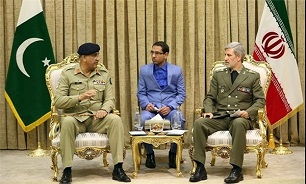US, Israel Most Dangerous Supporters of Terrorism in Region

"Unfortunately, certain regional and trans-regional states have not given up their destabilizing acts and have been entangled in the US and the Zionist regime's trap and are after disintegration of the regional states and turmoil after attacking Afghanistan and Iraq, creation of the ISIL in Iraq and Syria and the war in Yemen. Such situation is no good to the region and the Muslim world," General Hatami said in a meeting with Pakistani Chief of Army Staff (COAS) General Qamar Javed Bajwa in Tehran on Tuesday.
He described the US and the Zionist regime as the biggest and most dangerous supporters of terrorism in the region, and said, "Extremism is the result of the US policies and war on terrorism is just a pretext by the White House statesmen to gain control over the Islamic territories and their resources."
"The Islamic Republic of Iran uses all its power and capacities to maintain regional security and territorial integrity of all countries," General Hatami said.
General Bajwa, for his part, underscored the Islamic countries' potentials, and said, "The regional and Muslim states' unity in the current sensitive conditions is among the necessities to establish sustainable stability and security and we hope to be able to form a united Islamic Ummah."
General Bajwa, heading a high-ranking military delegation has traveled to Tehran at the invitation of Chief of Staff of Iran's Armed Forces Major General Mohammad Hossein Baqeri.
General Baqeri and General Bajwa in a meeting in Tehran on Monday underlined the need to expand defense and military cooperation between the two countries.
During the meeting in the Iranian capital today, the top Iranian and Pakistani generals underlined the need for enhanced security and defense cooperation between Tehran and Islamabad.
The two army chiefs stressed the need for expansion of defense and security relations aimed at resolving common issues, particularly in identifying and combating factors that cause the spread of terrorist activities along Iran and Pakistan’s shared borders.
Making optimal use of existing capacities in various international and regional communities, using the two countries’ defense and political potentials to help settle regional conflicts, and joint cooperation between the two sides free of foreign intervention were also among the topics of discussion in the Monday meeting.
